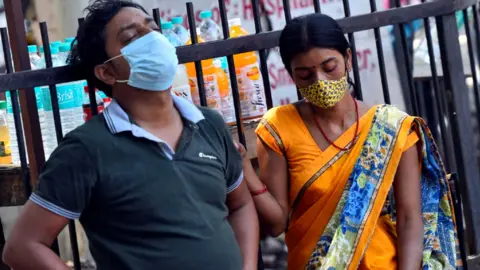Why India's Covid crisis matters to the whole world
 Reuters
ReutersThe harrowing scenes from India have shocked the world, as the country struggles with soaring cases of Covid.
But the outbreak isn't just a crisis for India - it's a crisis for everyone.
"The virus doesn't respect borders, or nationalities, or age, or sex or religion," says Dr Soumya Swaminathan, the World Health Organization's chief scientist.
"And what's playing out in India now unfortunately has been played out in other countries."
The pandemic has revealed just how interconnected the world is. And if a country has very high levels of infection, then it's likely to spread to other countries.
Even with travel restrictions, multiple tests and quarantine, infections can still leak out; and if a traveller has come from somewhere where the virus is very prevalent, they have a higher chance of taking the virus with them. On a recent flight from New Delhi to Hong Kong about 50 passengers tested positive for Covid-19.
But there's another concern with India's high infection rates: variants.
A new variant has emerged in India called B.1.617. It's been dubbed by some as the "double mutant" because of two key mutations on the spike of the virus. There's some lab evidence that suggests it's slightly more transmissible and that antibodies may find it harder to block the virus, but scientists are still assessing how much immunity is lost.
"I don't think there's any evidence that it's an escape mutation [which would mean] it fundamentally can't be stopped by the vaccines," Dr Jeff Barrett, director of the Covid-19 Genomics Initiative at the Wellcome Sanger Institute, told BBC News.
"I think we have to obviously watch carefully, but there's at present no reason to panic about it."
But the higher the number of Covid cases a country has, the more likely it is that new variants will emerge. That's because every single infection gives the virus a chance to evolve and a major concern is that mutations could arise that render vaccines ineffective.
"The way to limit viral variants emerging in the first place is to prevent the virus replicating in us… so the best way to control variants is actually to control the global amount of disease that we have at the moment," explains Prof Sharon Peacock, Director of the Covid-19 Genomics UK consortium (Cog-UK).
Lockdowns and social distancing measures will do this - but vaccination is also vital.
This is happening slowly in India: so far less than 10% of its population have had the first dose of the vaccine and less than 2% are fully vaccinated.
This is despite the fact that it's home to the world's biggest vaccine manufacturer - the Serum Institute of India. And this is another reason why India's surge in cases has a knock-on effect for the rest of the world.
In March, as infections in India started to surge, authorities there halted large exports of the Oxford-AstraZeneca vaccine.
That included vaccines for the UN-backed Covax scheme to provide doses to low and middle-income countries. On Monday, the Global Vaccine Alliance (Gavi), which is a partner in the scheme, said it was waiting to hear when supplies from India would resume.
This will certainly impact on vaccination roll-outs in many countries. But it means more of India's vaccines are diverted for domestic use, while it tries to ramp up production.
And with India's dire situation, scientists say this is a priority.
"We really need to double down on vaccination as quickly as possible or the virus is going to try and do everything it can to keep on spreading from person to person," says Swaminathan.
Globally, the pandemic shows no sign of easing, with the virus devastating country after country.
The situation in India is a bleak reminder that none of us will be safe until everyone is safe.
Follow Rebecca on Twitter
